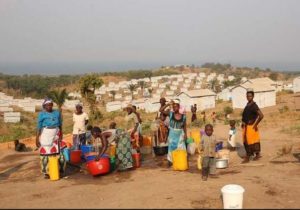Refugee resettlement hits ten year low
 Just slightly more than 50,000 people fleeing conflict or persecution will find a safe haven in which to start new lives in 2018, the lowest number in ten years according to UN figures.
Just slightly more than 50,000 people fleeing conflict or persecution will find a safe haven in which to start new lives in 2018, the lowest number in ten years according to UN figures.
While countries like Australia, Britain, Canada and Norway are taking in more refugees, many others are taking far fewer than they previously have.
Chief among the nations closing the door on refugees is Donald Trump’s America.
The US took in 68 per cent of the 770,000 refugees permanently resettled in the last 10 years – an average of about 51,000 per year, according to the UN.
But the Trump administration has slashed the US’ quota and looks to be cutting it even further.
This year, fewer than 10,000 refugees had entered the US by the end of July.
And with the end of US fiscal year approaching this month, official government figures show the United States will have taken in its lowest number of refugees since 1977
A State Department list shows 19,899 arrivals, and non-profit Refugee Council USA predicts a total of 22,000 by the end of September.
This number is less than half the reduced ceiling of 45,000 admissions announced by the US government last year.
Even with the limits imposed by the Trump administration, the US will still take in more refugees than any other country.
After a temporary increase around the Syrian crisis in 2016, other countries are barely matching their own 10-year averages, and none seem ready to start closing the gap left by US cuts.
In 2016 around 126,000 refugees were given a route to permanent resettlement and citizenship in a new country in 2016.
That looks like a record that will stand for some time.
The UN’s refugee agency UNHCR says that developing nations, who can least afford the burden, are host to 84 per cent of the world’s refugees.
Typically, refugee resettlement means permanent residency and eventual citizenship granted to refugees in another country.
Usually, a family of resettled refugees will have already left their country of origin and found asylum in a neighbouring country
From there, particularly vulnerable or deserving cases can be recommended by UNHCR and put forward to host countries.
The UNHCR’s Regional Representative in Australia Thomas Albrecht said that this year, globally, there were 1.2 million people in need of resettlement but just 100,000 places available – a decrease of 43 per cent on last year.
Mr Albrecht also said that in 2016 $US4 billion was donated to efforts to support refugees but that figure fell 41 per cent short of the funds needed.
This year $US4.2 billion has been raised but that is just half the amount needed and it is forcing a prioritisation of where resources are targeted. Mr Albrecht said this amounted to “impossible choices”.
But he said a new ‘Global Compact on Refugees’ offered hope for a comprehensive global response to the refugee crisis and the end of refugees as tools in national politics.
Laurie Nowell
AMES Australia Senior Journalist












